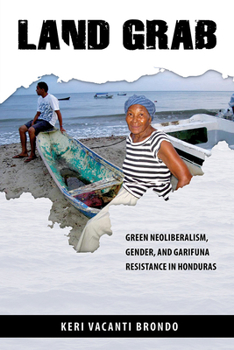Land Grab: Green Neoliberalism, Gender, and Garifuna Resistance in Honduras
Select Format
Select Condition 
Book Overview
Land Grab is a rich ethnographic account of the relationship between identity politics, neoliberal development policy, and rights to resource management in Garifuna communities on the north coast of Honduras, before and after the 2009 coup d'?tat. The Garifuna are a people of African and Amerindian descent who were exiled to Honduras from the British colony of St. Vincent in 1797 and have long suffered from racial and cultural marginalization. Employing approaches from feminist political ecology, critical race studies, and ethnic studies, Keri Vacanti Brondo illuminates three contemporary development paradoxes in Honduras: the recognition of the rights of indigenous people at the same time as Garifuna are being displaced in the name of development; the privileging of foreign research tourists in projects that promote ecotourism but result in restricting Garifuna from traditional livelihoods; and the contradictions in Garifuna land-rights claims based on native status when mestizos are reserving rights to resources as natives themselves.
Brondo's book asks a larger question: can "freedom," understood as well-being, be achieved under the structures of neoliberalism? Grounding this question in the context of Garifuna relationships to territorial control and self-determination, the author explores the "reregulation" of Garifuna land; "neoliberal conservation" strategies like ecotourism, research tourism, and "voluntourism;" the significant issue of who controls access to property and natural resources; and the rights of women, who have been harshly impacted by "development." In her conclusion, Brondo points to hopeful signs in the emergence of transnational indigenous, environmental, and feminist organizations.
Brondo's book asks a larger question: can "freedom," understood as well-being, be achieved under the structures of neoliberalism? Grounding this question in the context of Garifuna relationships to territorial control and self-determination, the author explores the "reregulation" of Garifuna land; "neoliberal conservation" strategies like ecotourism, research tourism, and "voluntourism;" the significant issue of who controls access to property and natural resources; and the rights of women, who have been harshly impacted by "development." In her conclusion, Brondo points to hopeful signs in the emergence of transnational indigenous, environmental, and feminist organizations.
Format:Paperback
Language:English
ISBN:0816535566
ISBN13:9780816535569
Release Date:January 2017
Publisher:University of Arizona Press
Length:248 Pages
Weight:0.80 lbs.
Dimensions:1.0" x 6.1" x 9.1"
Customer Reviews
0 rating





